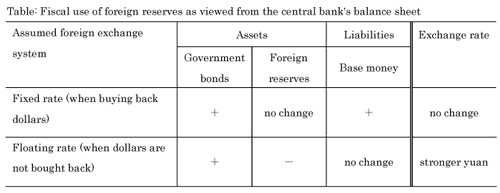China's foreign exchange reserves have been surging in recent years, and are expected to top the $1 trillion mark before the end of this year. Most of those reserves are being lent to the United States in the form of investments in U.S. Treasuries, and are exacerbating the U.S.' excessive consumption trend and its accompanying trade deficit. However, China is still a developing country where nearly 100 million people, mostly in rural areas, are living in poverty on less than $1 a day. From the perspective of fairness and efficiency, rather than lending the money to the U.S., China should use its huge foreign reserves as funds to resolve poverty concerns such as the "three agriculture-related problems (of agriculture, rural villages, and farmers)." (note 1) The former use of reserves only adds flowers to the brocade, whereas the latter would extend assistance when people are in the direst of straits (note 2).
China is striving to build a "harmonious society" based on the "concept of scientific view of development," but a massive amount of funds is needed to realize this. Among measures to achieve this goal, a plan to build "new rural villages" to help resolve the three agriculture-related problems has been included in the 11th Five-year Plan that begins this year, but the issue of how to finance the project has yet to be resolved. Indeed efforts have already been made to ease the burden on farmers by abolishing the farming tax, but because the central government has not offered adequate fiscal compensation, there are many cases where public services in rural areas have actually worsened. If a portion of China's foreign exchange reserves were to be used to improve infrastructure, education, medical services and pension funds in rural areas, it would not only reduce the gap between rural and urban areas but also boost the potential growth rate of the entire country through the improvement of human and social capital. Of course, the World Trade Organization strictly restricts agricultural subsidization, but the use of public funds for public goods and services in rural areas would not violate WTO rules.
One specific way to utilize foreign exchange reserves for fiscal purposes would be for the government to issue bonds to procure dollars from the central bank. As the money would be used domestically, the government would have to convert the dollars into yuan. However, the impact on the economy would be different depending on whether the dollars released into the market are again bought back by the central bank. (table)
First, if the central bank were to buy back the dollars it gave to fiscal authorities (through such means as market intervention or dealing directly the fiscal authorities) in order to stabilize exchange rates, foreign exchange reserves would return to their original levels and money supply (base money) would increase by the amount of government bonds purchased by the central bank. This is nothing but the government's monetization of fiscal funds, and is likely to lead to higher inflation.
In contrast, if the central bank were not to buy back the dollars it handed over to fiscal authorities, the yuan would rise against the dollar due to dollar-selling/yuan-buying pressures in currency markets, but prices would remain stable because there would be no change in money supply. Farmers' incomes may decline because prices of agricultural products would fall (in yuan terms) due to a stronger yuan. However, if the government uses the money it raised from the foreign exchange reserves to actively tackle the three agriculture-related problems, sufficient compensation for farmers should be possible. When we also consider the fact that a "strong yuan" would also lead to a smaller trade surplus and thus reduce trade frictions, it can be expected that using foreign exchange reserves to resolve the three agriculture-related problems would kill two birds - correcting both external imbalances and internal disparities - with one stone.



